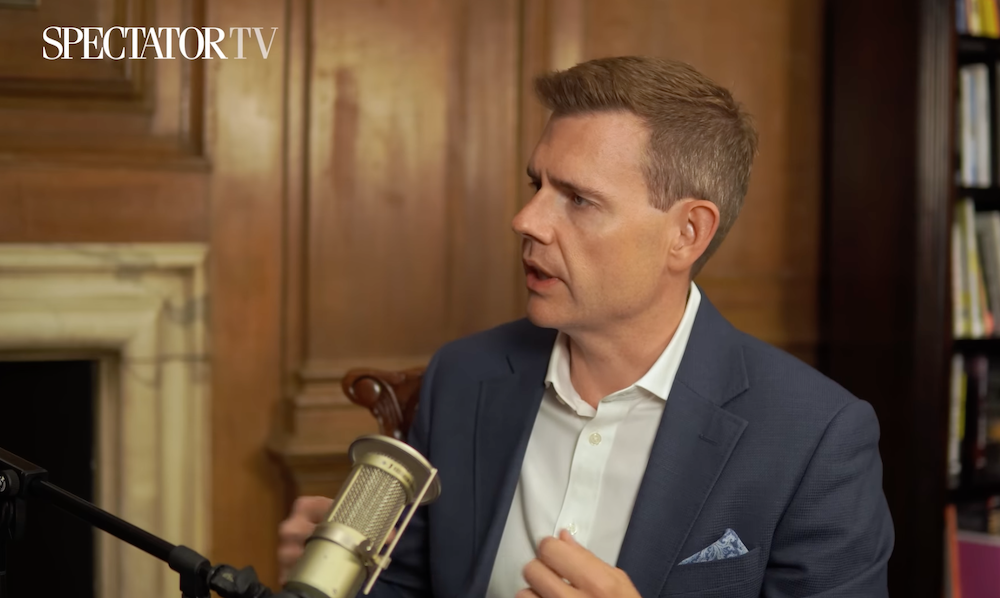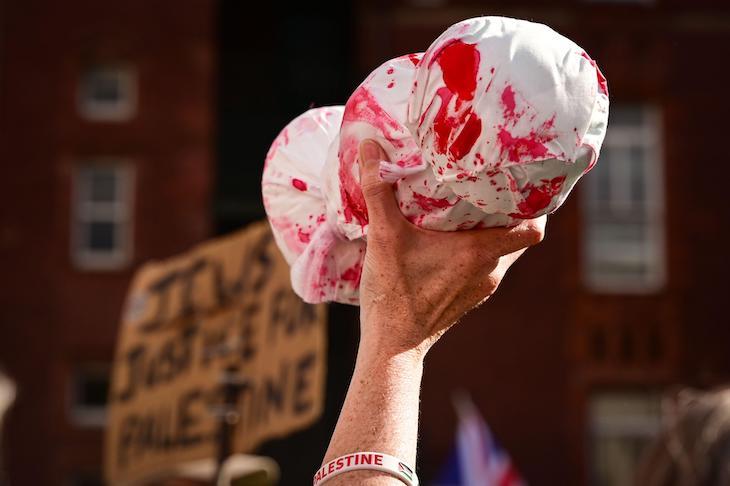It was only a matter of time before the Guardian went for Professor Matthew Goodwin. The honorary president of Reform’s new student wing came under attack this week after he said a UK-born man of African heritage – who is alleged to have stabbed ten people on a train near Huntingdon earlier this month – was not truly ‘British’. Any sane person would agree that the actions of the train attacker did not uphold British ‘values’. Yet the Guardian was determined to whip up a storm of condemnation.
It’s as if terror attacks and mass stabbings are to be treated as just a normal part of life in diverse, modern Britain
Goodwin’s ‘crime’ was to write that ‘migrants do not instantly adopt the host country’s “British” or “English” culture and identity the moment they sign a few papers.’ On X, when someone pointed out that the alleged attacker, Anthony Williams, was born in the UK, Goodwin hit back: ‘So were all of the 7/7 bombers. It takes more than a piece of paper to make somebody “British”.’ Many Brits would agree with Goodwin’s point – but that didn’t stop the Guardian from denouncing him.
‘Matt Goodwin’s racist rhetoric is a disgrace,’ Max Wilkinson, the Lib Dems’ home affairs spokesperson, told the paper. A Labour spokesperson chimed in that Goodwin had ‘unpleasant views on race’ and that ‘this type of language is completely unacceptable’. For his part, Goodwin replied: ‘Clearly many integrate successfully but [the] fact remains we have British citizens who reject integration in favour of retaining their origin culture. This is as much our failure as theirs but it is the reality we are living with. It is not “far-right” to think this.’
The Guardian hit job was thin gruel, and no doubt Reform will shrug it off. To insist that monsters like the 7/7 bombers were meaningfully British seems a strange hill to die on – not least for those hoping to maintain that UK immigration policy has succeeded.
If Britishness is just about certain ideas and standards of behaviour, as we’re so often told, surely visiting terror on the public must disqualify you from being British? If anything is ‘the antithesis of everything Paddington stands for’, it’s a knife rampage on a commuter train. Instead, the same people who tell us immigration is seamless and a benefit to the country are insisting on the inalienable ‘Britishness’ of heinous mass murderers of migrant backgrounds. It’s as if terror attacks and mass stabbings are to be treated as just a normal part of life in diverse modern Britain.
As Dan Hannan wrote in The Spectator this week, the alleged Huntingdon attacker may have been ‘UK-born’ – but so were the 7/7 bombers, the men who killed fusilier Lee Rigby, the Manchester Arena bomber Salman Abedi and his brother, the Westminster Bridge and London Bridge stabbing attackers, and the Southport killer, Axel Rudakubana. These were individuals who ‘despite having grown up in this country… ended up hating our ways so much that they were prepared to risk their own lives to kill their fellow citizens’, Hannan writes.
Rather than the Guardian debating what it’s politically correct to call such barbarians, perhaps a better question for the paper to ask is whether these people felt they were truly British. ‘Our religion is Islam’, said the Leeds-born leader of the 7/7 bombings, Mohammad Sidique Khan, ‘Your democratically-elected governments continuously perpetuate atrocities against my people all over the world.’ Clearly, many of these attackers viewed their Muslim identity as in direct conflict with Britain.
Manchester Arena bomber Salman Abedi called Britons ‘infidels’ who ‘are unjust to the Arabs’ according to a relative. It seems he interpreted the bloody killing of a childhood friend by a Manchester gang as an anti-Muslim attack, for which he wanted revenge on British society. Meanwhile, after Michael Adebolajo and his accomplice ran over and stabbed to death Lee Rigby, a 25-year-old father, outside his Woolwich barracks, Adebolajo told a bystander: ‘The only reason we have killed this man today is because Muslims are dying daily by British soldiers.’
Before his atrocity in Southport, Axel Rudakubana told Childline he had been the victim of racist bullying. In fact there is little evidence of this, with two members of staff at his ‘very small’ school for excluded pupils rubbishing the claim to the Southport Inquiry. More likely, the teenager, who was ‘socially isolated’ and had ‘generally a lack of respect of other pupils and staff’, merely interpreted his treatment in this light. What is clear is that this black, second-generation immigrant felt himself apart from and victimised by British society. For years in his filthy bedroom, he nursed a seething hatred of Britain, reading books about genocide and settler violence against colonialists. Then he deliberately attacked our society’s most vulnerable members, visiting horrors on young girls at a dance class. After his arrest he told police, unprompted: ‘It’s a good thing those children are dead. I’m so glad. I’m so happy.’
A willingness to visit misery on an easy target also motivated the grooming gangs. Their crimes were racially and religiously aggravated, which, by definition, could only have happened in a multi-ethnic society. The white victims, whose abusers called them ‘white slag’, ‘white c***’, ‘white b****’, were targeted by predominantly Pakistani gangs because they were a despised ‘other’, to borrow the language beloved of left-wing academics. ‘All of you treated [your victims] as though they were worthless and beyond all respect’, as one judge told a Rochdale grooming gang in 2012, adding that ‘one of the factors that led to that was that they were not of your community or religion’. The vile child rapists enjoyed the sense of superiority the abuse lent them. ‘We’re here to f*** all the white girls and f*** the government’, one abuser told his victim. ‘We are the supreme race, not these white bastards’, another said in court.
Does a single British person genuinely think of these demons as representative of Britain? For decades, immigration liberals have sought to define British identity as loosely as possible in order to be as ‘inclusive’ as possible. The result has been to devalue the concept of British identity beyond all substantial meaning.







Comments